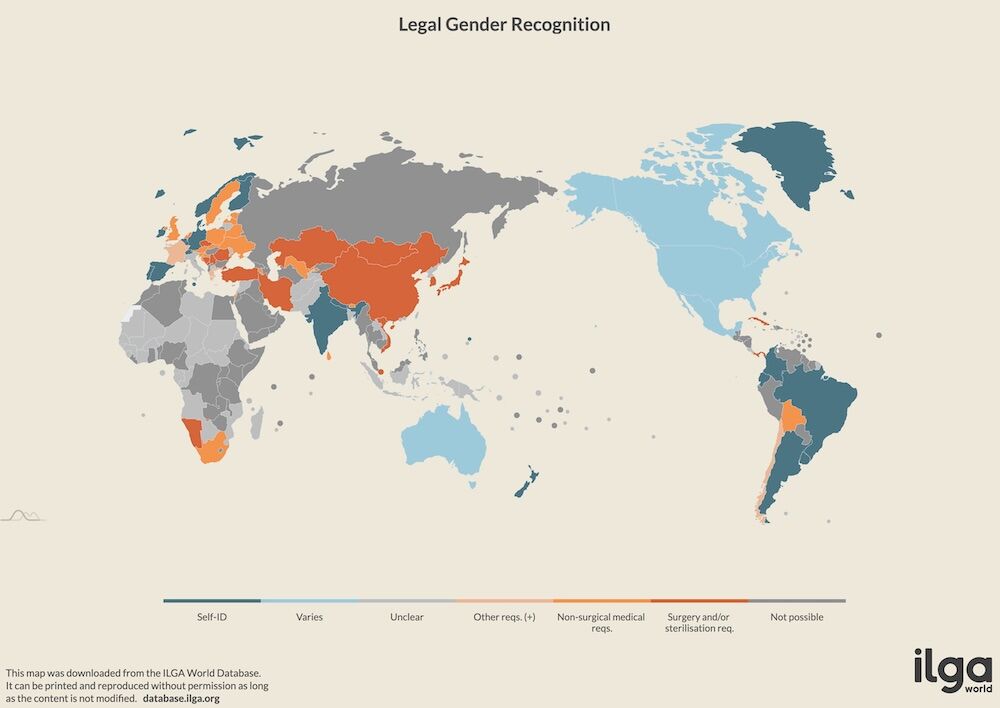
For the first time in its 13-year history, Transgender Europe’s (TGEU) annual map tracking trans rights in Europe and Central Asia showed a regression of rights across both continents. The map is similar to one recently released by the International Lesbian, Gay, Bisexual, Trans, and Intersex Association (ILGA). One trans journalist said the TGEU map demonstrates “a thriving anti-trans ecosystem, where far-right hate is both exported from and imported to America.”
“Setbacks in human rights of trans people across Europe and Central Asia now clearly outweigh progress,” TGEU wrote in a post announcing its new map. “Coordinated anti-trans campaigns are converging with broader anti-rights and anti-[European Union] forces, fueled by internal and external actors, from Trump-aligned global networks to the Kremlin.”
Related
Republicans are obsessed with trans hate. This one election shows how Democrats can push back.
Donald Trump said that Kamala Harris only cares about “they/them.” But he’s the one who cares more about attacking trans rights than the economy.
TGEU noted that the countries of Georgia and Hungary recently introduced anti-trans and anti-LGBTQ+ constitutional amendments, Republika Srpska (Bosnia) repealed hate crimes and hate speech protections, and the U.K. Supreme Court recently struck down trans anti-discrimination protections. Only one Asian nation, Kazakhstan, still provides legal recognition of trans people, TGUE added.
Never Miss a Beat
Subscribe to our newsletter to stay ahead of the latest LGBTQ+ political news and insights.
Subscribe to our Newsletter today
Though TGEU noted that the Court of Justice of the European Union (CJEU) has repeatedly affirmed that trans people are explicitly protected under European Union (EU) law, it also noted that The Heritage Foundation — the anti-LGBTQ+ conservative think tank that drafted Project 2025, the blueprint for Trump’s second term — is collaborating with illiberal forces in Poland and Hungary to dismantle the CJEU and undermine the EU’s “ideologically motivated” requirements for member nations.
These forces in Poland and Hungary reportedly have ties to the Russian government. Russian President Vladimir Putin has repeatedly claimed that Western nations’ pro-LGBTQ+ policies seek to impose “perversions” on other countries. Putin has overseen a more than decade-long crackdown on LGBTQ+ citizens and groups, and Trump-supporting Christian conservatives in the U.S. have praised Putin’s actions.
“TGEU’s updated index also demonstrated a thriving anti-trans ecosystem, where far-right hate is both exported from and imported to America,” wrote trans journalist Erin Reed.
TGEU said of the regressive political trend, “Every policy setback in the region translates into real human consequences… They are deliberate decisions with harmful consequences for people’s safety and their lives.”
“The treatment of trans people is being weaponised to erode the EU’s foundational values of human rights, dignity, and solidarity,” the organization continued. “Europe must rise to the challenge and fulfil its promise — by advancing, and not retreating, from the values it was built on, both within its borders and beyond.”
TGEU called on the UC Commission to add explicit mentions of gender identity and gender expression in its anti-discrimination protections that must be followed by the EU’s 27 member nations.

TGEU’s map resembles one released on May 12 by ILGA, the International Lesbian, Gay, Bisexual, Trans and Intersex Association. ILGA’s map shows that many European and Asian countries have policies forbidding legal recognition of trans and nonbinary individuals or requiring individuals to first overcome certain legal or medical barriers before attaining their full civil rights.
In general, the EU’s legal framework prohibits discrimination on the basis of sex, which is interpreted to include transgender people. However, member nations still implement anti-LGBTQ+ policies, often waiting for these policies to be challenged in the CJEU or enforced through EU trade and diplomatic consequences.
Subscribe to the LGBTQ Nation newsletter and be the first to know about the latest headlines shaping LGBTQ+ communities worldwide.